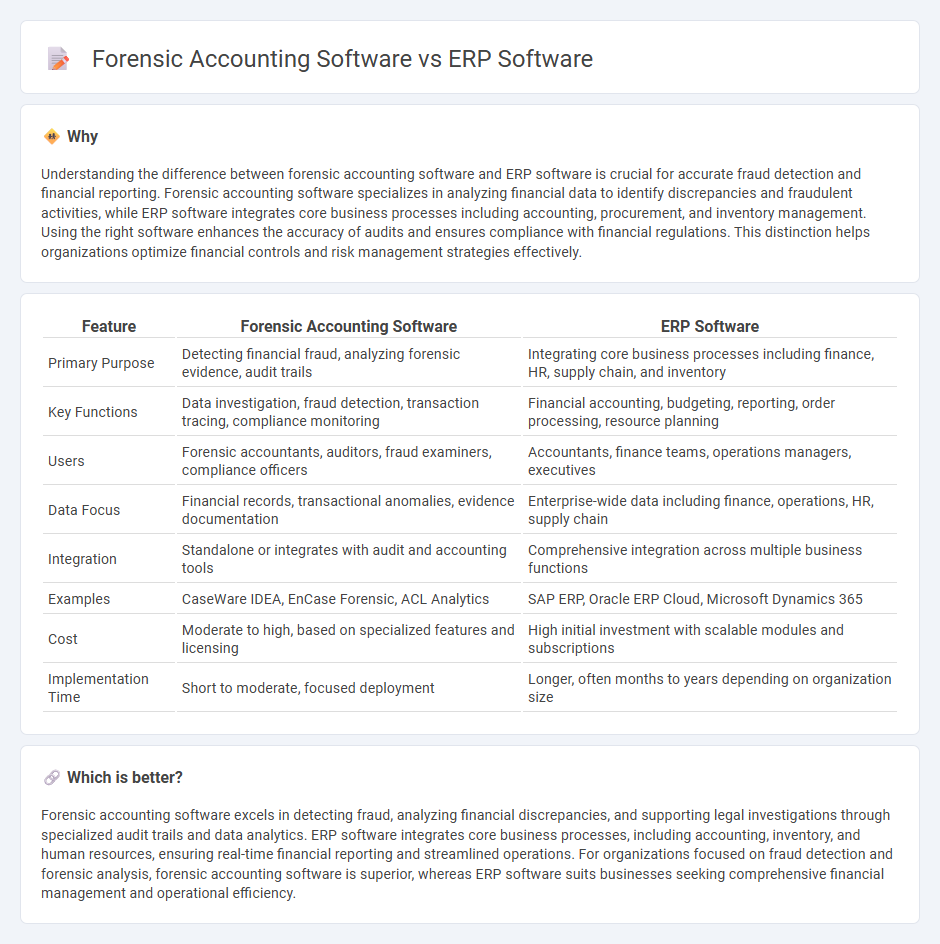
Forensic accounting software specializes in detecting, analyzing, and preventing financial fraud through detailed transaction tracking and data forensics, while ERP software integrates core business processes including finance, supply chain, and inventory management for overall operational efficiency. Forensic accounting tools offer advanced audit trails, data analytics, and real-time anomaly detection, contrasting with ERP systems' broader scope of centralized resource planning and process automation. Explore the distinct functions and benefits of forensic accounting software versus ERP systems to optimize your organization's financial controls and operational workflows.
Why it is important
Understanding the difference between forensic accounting software and ERP software is crucial for accurate fraud detection and financial reporting. Forensic accounting software specializes in analyzing financial data to identify discrepancies and fraudulent activities, while ERP software integrates core business processes including accounting, procurement, and inventory management. Using the right software enhances the accuracy of audits and ensures compliance with financial regulations. This distinction helps organizations optimize financial controls and risk management strategies effectively.
Comparison Table
| Feature | Forensic Accounting Software | ERP Software |
|---|---|---|
| Primary Purpose | Detecting financial fraud, analyzing forensic evidence, audit trails | Integrating core business processes including finance, HR, supply chain, and inventory |
| Key Functions | Data investigation, fraud detection, transaction tracing, compliance monitoring | Financial accounting, budgeting, reporting, order processing, resource planning |
| Users | Forensic accountants, auditors, fraud examiners, compliance officers | Accountants, finance teams, operations managers, executives |
| Data Focus | Financial records, transactional anomalies, evidence documentation | Enterprise-wide data including finance, operations, HR, supply chain |
| Integration | Standalone or integrates with audit and accounting tools | Comprehensive integration across multiple business functions |
| Examples | CaseWare IDEA, EnCase Forensic, ACL Analytics | SAP ERP, Oracle ERP Cloud, Microsoft Dynamics 365 |
| Cost | Moderate to high, based on specialized features and licensing | High initial investment with scalable modules and subscriptions |
| Implementation Time | Short to moderate, focused deployment | Longer, often months to years depending on organization size |
Which is better?
Forensic accounting software excels in detecting fraud, analyzing financial discrepancies, and supporting legal investigations through specialized audit trails and data analytics. ERP software integrates core business processes, including accounting, inventory, and human resources, ensuring real-time financial reporting and streamlined operations. For organizations focused on fraud detection and forensic analysis, forensic accounting software is superior, whereas ERP software suits businesses seeking comprehensive financial management and operational efficiency.
Connection
Forensic accounting software and ERP software are interconnected through their ability to analyze, track, and audit financial transactions within an organization's integrated system. ERP software consolidates business processes and financial data, providing comprehensive records that forensic accounting tools utilize to detect fraud, discrepancies, and compliance issues. This synergy enhances accuracy in financial investigations by automating data extraction and supporting detailed forensic analysis.
Key Terms
Integration
ERP software offers comprehensive integration by consolidating financial, operational, and human resource data into a single platform, enhancing real-time decision-making and workflow efficiency. Forensic accounting software specializes in integrating detailed transaction data and audit trails to detect fraud, discrepancies, and support legal investigations. Explore the differences further to understand which integration capabilities best meet your organizational needs.
Audit Trail
ERP software integrates comprehensive audit trail features, recording every transaction and modification to ensure data integrity and regulatory compliance. Forensic accounting software specializes in detailed audit trail analysis, enabling auditors to detect fraud, irregularities, and unauthorized activities through advanced data examination techniques. Explore the critical differences in audit trail capabilities between ERP and forensic accounting software to enhance your financial oversight.
Data Analysis
ERP software integrates data across business functions, offering comprehensive analytics for financial reporting, inventory management, and operational efficiency. Forensic accounting software specializes in deep data analysis to identify irregularities, fraud detection, and detailed audit trails within financial transactions. Explore how each tool can enhance your organization's data analysis capabilities and improve decision-making.
Source and External Links
6 Best ERP Software Evaluated By Experts for 2025 - ERP software integrates and manages core business processes such as finance, supply chain, manufacturing, CRM, and HR within a unified platform, centralizing data and enabling real-time visibility for stakeholders; leading solutions include SAP, Oracle Netsuite, Sage, Microsoft Dynamics 365, SysPro, and Odoo.
The 8 best ERP software systems in 2025 - SAP S/4HANA stands out as a premier ERP solution for large enterprises due to its scalability, advanced analytics, customization options, and support for compliance, though it has a complex and costly implementation process.
Enterprise resource planning - ERP systems provide integrated management of main business processes in real time using a shared database, improving efficiency by connecting departments like manufacturing, sales, and accounting, and can be deployed locally or in the cloud.
 dowidth.com
dowidth.com